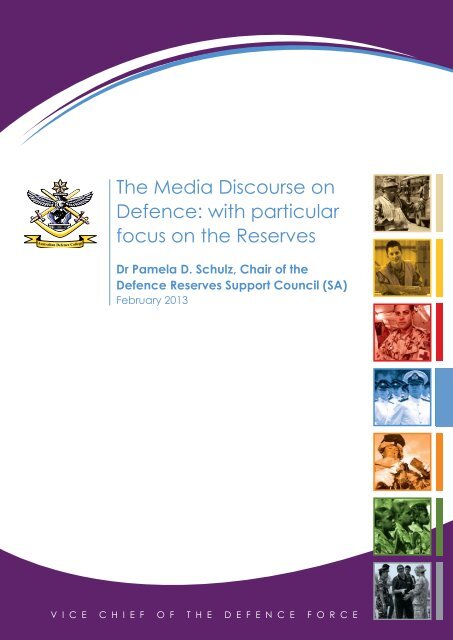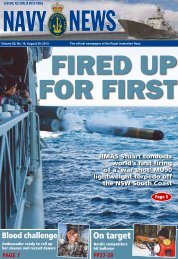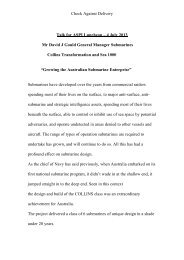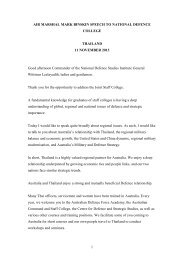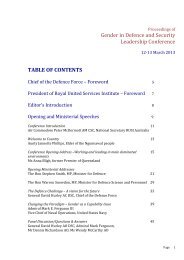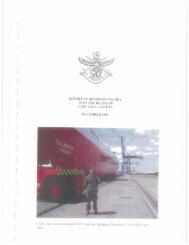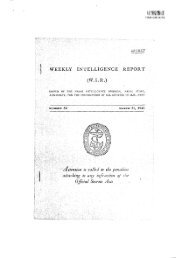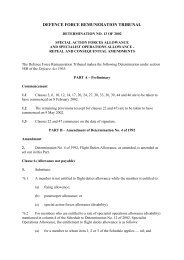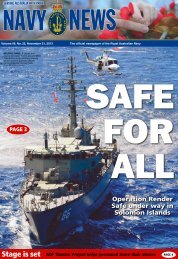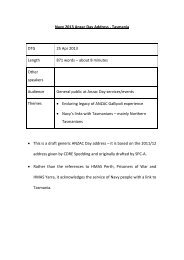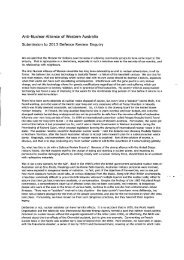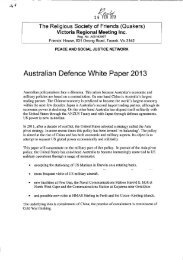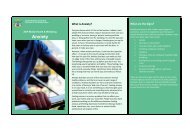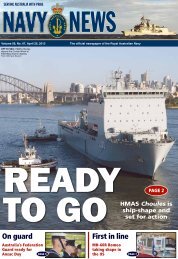with particular focus on the Reserves - Department of Defence
with particular focus on the Reserves - Department of Defence
with particular focus on the Reserves - Department of Defence
Create successful ePaper yourself
Turn your PDF publications into a flip-book with our unique Google optimized e-Paper software.
The Media Discourse <strong>on</strong><br />
<strong>Defence</strong>: <str<strong>on</strong>g>with</str<strong>on</strong>g> <str<strong>on</strong>g>particular</str<strong>on</strong>g><br />
<str<strong>on</strong>g>focus</str<strong>on</strong>g> <strong>on</strong> <strong>the</strong> <strong>Reserves</strong><br />
Dr Pamela D. Schulz, Chair <strong>of</strong> <strong>the</strong><br />
<strong>Defence</strong> <strong>Reserves</strong> Support Council (SA)<br />
February 2013<br />
V I C E C H I E F O F T H E D E F E N C E F O R C E
The Media Discourse <strong>on</strong> <strong>Defence</strong>: <str<strong>on</strong>g>with</str<strong>on</strong>g> <str<strong>on</strong>g>particular</str<strong>on</strong>g> <str<strong>on</strong>g>focus</str<strong>on</strong>g><br />
<strong>on</strong> <strong>the</strong> <strong>Reserves</strong><br />
Dr Pamela D. Schulz, Chair <strong>of</strong> <strong>the</strong> <strong>Defence</strong> <strong>Reserves</strong> Support Council (SA)<br />
Introducti<strong>on</strong><br />
As early as 1923, it was suggested that journalism held <strong>the</strong> key to popular support for service pers<strong>on</strong>nel<br />
in war and in peace. 1 Today, this is still true, <str<strong>on</strong>g>with</str<strong>on</strong>g> <strong>of</strong>ten a torrent <strong>of</strong> informati<strong>on</strong>—almost akin to what has<br />
been called <strong>the</strong> ‘super‐saturati<strong>on</strong>’ <strong>of</strong> informati<strong>on</strong>, images and issues—about defence forces in <strong>the</strong> modern<br />
media. 2 Like all government‐funded bodies, Australia’s <strong>Defence</strong> organisati<strong>on</strong> is rightly open to scrutiny.<br />
But it is also a favourite <str<strong>on</strong>g>with</str<strong>on</strong>g> news reporters for <strong>the</strong> drama and issues that <strong>of</strong>ten surround it, evidence <strong>of</strong><br />
which can be found <strong>on</strong>‐line, <strong>on</strong> televisi<strong>on</strong>, <strong>on</strong> radio and <strong>of</strong>ten in newspapers, where evocative headlines<br />
alert readers to <strong>the</strong> latest issue, problem or scandal.<br />
A 2006 study <strong>of</strong> percepti<strong>on</strong>s <strong>of</strong> news credibility about <strong>the</strong> war in Iraq found that stories <strong>on</strong>‐line and <strong>on</strong><br />
internet blog sites were more believable to c<strong>on</strong>sumers than o<strong>the</strong>r sources, who saw <strong>the</strong>m as less<br />
‘government aligned’. 3 Blog sites <strong>of</strong>ten reflect a similar anti‐Government, anti‐<strong>Defence</strong> line, not<br />
infrequently undermining <strong>Defence</strong> and its pers<strong>on</strong>nel. However, this not new; <strong>on</strong>ly <strong>the</strong> manner <strong>of</strong><br />
presentati<strong>on</strong> has changed. Particularly from <strong>the</strong> days <strong>of</strong> <strong>the</strong> Vietnam War, <strong>the</strong> presentati<strong>on</strong> <strong>of</strong> news <strong>on</strong> our<br />
allies and our serving men and women has <strong>of</strong>ten evidenced negative reporting, <str<strong>on</strong>g>with</str<strong>on</strong>g> a resultant impact <strong>on</strong><br />
<strong>the</strong> public’s percepti<strong>on</strong>.<br />
It will be argued in this article that c<strong>on</strong>temporary opini<strong>on</strong> pieces, <str<strong>on</strong>g>particular</str<strong>on</strong>g>ly in <strong>the</strong> form <strong>of</strong> blogs and <strong>on</strong>line<br />
stories, are beginning to show a similar trend. If it c<strong>on</strong>tinues, this vein <strong>of</strong> reporting may lead again to<br />
Australia’s serving pers<strong>on</strong>nel, including <strong>the</strong> <strong>Reserves</strong>, having to deal <str<strong>on</strong>g>with</str<strong>on</strong>g> negative public resp<strong>on</strong>ses. This<br />
is an issue that needs to be countered, including by <strong>the</strong> development <strong>of</strong> an appropriate strategic<br />
communicati<strong>on</strong>s strategy.<br />
The Afghanistan experience<br />
Perhaps unsurprisingly, many <strong>of</strong> <strong>the</strong> media headlines covering <strong>the</strong> war in Afghanistan <str<strong>on</strong>g>focus</str<strong>on</strong>g> <strong>on</strong> ADF or<br />
coaliti<strong>on</strong> casualties. However, <strong>the</strong>re is <strong>of</strong>ten an underlying view <str<strong>on</strong>g>with</str<strong>on</strong>g>in editorial pieces which questi<strong>on</strong>s<br />
<strong>the</strong> missi<strong>on</strong>, or simply asks <strong>the</strong> reader or viewer ‘Why are we still in this war?’. In a 2009 article about <strong>the</strong><br />
situati<strong>on</strong> in Afghanistan, Justin Kelly asserted that (at least in some commentary):<br />
The purpose <strong>of</strong> <strong>the</strong> media <strong>of</strong>fensive is to undermine <strong>the</strong> internati<strong>on</strong>al c<strong>on</strong>sensus supporting<br />
c<strong>on</strong>tinued counter‐insurgency and to c<strong>on</strong>strain <strong>the</strong> abilities <strong>of</strong> <strong>the</strong> counter insurgent to apply force. 4<br />
Kelly c<strong>on</strong>tends that <strong>the</strong> steady stream <strong>of</strong> headlines outlining casualties, or difficulties in working <str<strong>on</strong>g>with</str<strong>on</strong>g><br />
Afghanistan’s Government, lead to a lack <strong>of</strong> political will to stay <str<strong>on</strong>g>focus</str<strong>on</strong>g>ed. He also suggests that Western<br />
liberal democracies are too risk averse and are seen by <strong>the</strong>ir opp<strong>on</strong>ents as ‘effete’ and lacking a strategic<br />
l<strong>on</strong>g‐term perspective. Such a str<strong>on</strong>g negative media legacy is bound to result in lack <strong>of</strong> popular support<br />
and negative public opini<strong>on</strong>, and may lead to difficult challenges for <strong>Defence</strong> pers<strong>on</strong>nel <strong>on</strong> <strong>the</strong>ir return to<br />
Australia. Negative ‘lexis’ (word choices) in <strong>the</strong> Australian media are <strong>of</strong>ten relayed to pers<strong>on</strong>nel while still<br />
serving overseas, and can add fur<strong>the</strong>r disquiet.<br />
A more recent example, from June 2011, is where The Advertiser in South Australia called for a poll <strong>on</strong> <strong>the</strong><br />
questi<strong>on</strong> ‘Should Australian troops be <str<strong>on</strong>g>with</str<strong>on</strong>g>drawn from Afghanistan?’. 5 The results were 83 per cent<br />
against <strong>the</strong> war, <str<strong>on</strong>g>with</str<strong>on</strong>g> <strong>on</strong>ly 17 per cent believing it was worth staying <strong>on</strong> to ‘complete <strong>the</strong> missi<strong>on</strong>’, a<br />
phrase heard repeatedly from senior political leaders. While clearly <strong>the</strong>se poll results are n<strong>on</strong>‐scientific—<br />
and <strong>on</strong>ly encourage a resp<strong>on</strong>se from those who have a stated positi<strong>on</strong>—<strong>the</strong> implicati<strong>on</strong> becomes clear<br />
when <strong>the</strong> media uses <strong>the</strong> poll results in a follow‐<strong>on</strong> story, asserting that ‘support for <strong>the</strong> war is declining<br />
rapidly’ and that <strong>the</strong>re are ‘calls to bring our diggers home’. 6
A carto<strong>on</strong> from about <strong>the</strong> same time shows a line <strong>of</strong> ghostly figures in uniform welcoming into <strong>the</strong><br />
hallowed halls <strong>of</strong> memory <strong>the</strong> latest c<strong>on</strong>tingent <strong>of</strong> young men who have paid <strong>the</strong> ultimate sacrifice for<br />
<strong>the</strong>ir nati<strong>on</strong>. 7 The carto<strong>on</strong> highlights <strong>the</strong> deep respect paid to those who have been killed <strong>on</strong> active<br />
service. But it also suggests <strong>the</strong> public is less forgiving when <strong>the</strong>y act like <strong>the</strong> rest <strong>of</strong> us. The obvious<br />
questi<strong>on</strong> is why are we so respectful <strong>of</strong> <strong>the</strong>se men and women <strong>on</strong>ly when <strong>the</strong>y have died? Why is <strong>the</strong><br />
media so <str<strong>on</strong>g>focus</str<strong>on</strong>g>ed <strong>on</strong> what is wr<strong>on</strong>g <str<strong>on</strong>g>with</str<strong>on</strong>g> our <strong>Defence</strong> forces and its activities, when mostly <strong>the</strong> individuals<br />
involved are just like any<strong>on</strong>e else but in uniform?<br />
<strong>Defence</strong> scandals and incompetence<br />
In recent years, <strong>the</strong>re have been a number <strong>of</strong> sensati<strong>on</strong>al media stories related to <strong>Defence</strong>, most notably<br />
<str<strong>on</strong>g>focus</str<strong>on</strong>g>ing <strong>on</strong> <strong>the</strong> behaviour <strong>of</strong> cadets at <strong>the</strong> Australian <strong>Defence</strong> Force Academy. Many <strong>of</strong> <strong>the</strong> headlines<br />
provide no nuances <strong>of</strong> <strong>the</strong> <strong>Defence</strong> envir<strong>on</strong>ment but <str<strong>on</strong>g>focus</str<strong>on</strong>g> directly <strong>on</strong> <strong>the</strong> deficits that are supposedly<br />
apparent in modern armed services. While it is true that headlines are used to create tensi<strong>on</strong> and set<br />
directi<strong>on</strong> for a reader (and <strong>the</strong>refore cannot be expected to delineate specific nuances), <strong>the</strong> catch‐all term<br />
‘<strong>Defence</strong>’ still implies an effect in all areas and <strong>of</strong>ten does not identify a specific <str<strong>on</strong>g>focus</str<strong>on</strong>g>.<br />
In additi<strong>on</strong>, <strong>the</strong>re are also regular asserti<strong>on</strong>s that women in <strong>the</strong> military are somehow more at risk <str<strong>on</strong>g>with</str<strong>on</strong>g>in<br />
<strong>Defence</strong> than elsewhere. Despite <strong>the</strong> fact that a number <strong>of</strong> women are regularly subject to violence in <strong>the</strong><br />
home or in <strong>the</strong>ir communities, those in uniform <strong>of</strong>ten seem to get fr<strong>on</strong>t‐page treatment.<br />
This pattern <strong>of</strong> pejorative headlines, designed to shock, has been identified as <strong>the</strong> ‘discourse <strong>of</strong><br />
disapproval’, which eventually leads to <strong>the</strong> ‘discourse <strong>of</strong> directi<strong>on</strong>’, in which organisati<strong>on</strong>s are influenced<br />
by media‐driven discourses. 8 While <strong>the</strong> study in questi<strong>on</strong> originally <str<strong>on</strong>g>focus</str<strong>on</strong>g>ed <strong>on</strong> <strong>the</strong> justice system in<br />
modern democracies, it is evident that o<strong>the</strong>r government‐funded instrumentalities are subjected to a<br />
similar pattern, wherein <strong>the</strong> organisati<strong>on</strong> in questi<strong>on</strong> attempts to ‘work <str<strong>on</strong>g>with</str<strong>on</strong>g> <strong>the</strong> media’ as it becomes<br />
more and more col<strong>on</strong>ised by <strong>the</strong> debate. Moreover, ‘when a specific positi<strong>on</strong> is c<strong>on</strong>sistently highlighted<br />
throughout media headlines [and reports], it establishes a <strong>the</strong>me or recurrent motif’. 9<br />
Recent <strong>Defence</strong>‐related headlines can be viewed as clear examples <strong>of</strong> <strong>the</strong> ‘discourse <strong>of</strong> disapproval’ and<br />
can create negative images in <strong>the</strong> minds <strong>of</strong> media c<strong>on</strong>sumers <strong>of</strong> <strong>the</strong> perceived shortcomings <strong>of</strong> <strong>the</strong><br />
organisati<strong>on</strong> and its pers<strong>on</strong>nel. This c<strong>on</strong>sistent attenti<strong>on</strong> arguably also <strong>the</strong>n extends to anything related to<br />
<strong>Defence</strong>. Indeed, apart from Anzac Day and its traditi<strong>on</strong>s, <strong>Defence</strong> <strong>of</strong>ten seems under a <str<strong>on</strong>g>particular</str<strong>on</strong>g>ly harsh<br />
media spotlight, <str<strong>on</strong>g>with</str<strong>on</strong>g> a brief selecti<strong>on</strong> <strong>of</strong> headlines from 2011 showing clear evidence <strong>of</strong> a media <str<strong>on</strong>g>focus</str<strong>on</strong>g> <strong>on</strong><br />
pejorative selecti<strong>on</strong> (see Table 1).<br />
Table 1. Selecti<strong>on</strong> <strong>of</strong> recent media headlines relating to <strong>Defence</strong><br />
Date Headline Comment<br />
ABC Radio 891 Talkback,<br />
12 April 2011<br />
Channel Nine evening<br />
news, 12 April 2011<br />
www.smh.com.au<br />
7 April 2001. Also in <strong>the</strong><br />
Sydney Morning Herald <strong>of</strong><br />
<strong>the</strong> same date<br />
The Advertiser, 13 April<br />
2011<br />
Many complaints [13] about<br />
<strong>the</strong> way <strong>Defence</strong> handles<br />
women. Invitati<strong>on</strong> to callers<br />
to call in <str<strong>on</strong>g>with</str<strong>on</strong>g> comments.<br />
‘<strong>Defence</strong> scandal deepens’<br />
‘<strong>Defence</strong> attacked in Battle <strong>of</strong><br />
Sexism’<br />
‘Give Women a Fair Go’<br />
No invitati<strong>on</strong> to ask about positive<br />
<strong>Defence</strong> experiences; <strong>on</strong>ly negative<br />
calls solicited.<br />
‘Scandal’ as descriptor could be<br />
commuted by suggesting ‘<strong>Defence</strong><br />
instigates investigati<strong>on</strong> into …’<br />
Minister Stephen Smith reported as<br />
having ‘lambasted <strong>the</strong> <strong>Defence</strong><br />
Force over <strong>the</strong> decisi<strong>on</strong> to force a<br />
female cadet … to face a<br />
disciplinary tribunal’.<br />
Insinuating women are treated<br />
unfairly.
Adelaidenow.com.au<br />
12 April 2011<br />
The Australian, 12 April<br />
2011<br />
The Advertiser, 12 April<br />
2011 and o<strong>the</strong>r News<br />
Limited outlets <strong>on</strong>‐line<br />
The Advertiser and News<br />
Limited outlets, including<br />
heraldsun.com.au<br />
12 April 2011<br />
The Australian,<br />
12 April 2011<br />
The Australian,<br />
12 April 2011<br />
The Australian,<br />
12 April 2011<br />
The Australian,<br />
13 April 2011<br />
The Advertiser, 14 April<br />
2011 and o<strong>the</strong>r News<br />
Limited outlets<br />
Newsltd.com.au, 6 May<br />
2011<br />
ABC News, 19 July 2011<br />
The Australian,<br />
19 July 2011<br />
The Australian,<br />
19 July 2011<br />
The Advertiser and<br />
<br />
The Advertiser,<br />
20 August 2011<br />
‘Can <strong>the</strong> ADF afford Social<br />
Engineering where women<br />
turn men from warriors into<br />
escorts, from mates to rivals?’<br />
Columnist Andrew Bolt defends but<br />
also criticises <strong>Defence</strong>.<br />
‘A History <strong>of</strong> Scandal’ An itemised checklist <strong>of</strong> recent<br />
<strong>Defence</strong> scandals, including HMAS<br />
Success and entertainers in <strong>the</strong><br />
Middle East area <strong>of</strong> operati<strong>on</strong>s.<br />
‘Best to steer clear <strong>of</strong> “out <strong>of</strong><br />
c<strong>on</strong>trol” <strong>Defence</strong> boys’<br />
‘Like running <str<strong>on</strong>g>with</str<strong>on</strong>g> a pack <strong>of</strong><br />
wolves’<br />
‘Hopes for cultural change<br />
from behaviour stock take’<br />
Editorial: ‘Coming to <strong>the</strong><br />
<strong>Defence</strong> <strong>of</strong> women in <strong>the</strong><br />
forces’<br />
‘Alleged rapists now top<br />
<strong>of</strong>ficers’<br />
‘Women harassed at every<br />
level’<br />
‘Drunken attack <strong>on</strong> daughter:<br />
ano<strong>the</strong>r military scandal<br />
emerges;<br />
‘<strong>Defence</strong> to lose 1000 jobs’<br />
Report that former Army<br />
Chief questi<strong>on</strong>s strategy in<br />
Afghanistan<br />
Article by former Chief <strong>of</strong><br />
Army titled ‘Rethink Diggers<br />
Role’<br />
‘A Make Do Culture has let<br />
Navy Down’<br />
Poll results from <strong>the</strong> questi<strong>on</strong><br />
‘Are our Troops making<br />
progress in Afghanistan?<br />
‘<strong>Reserves</strong> go into Battle’<br />
Augmented by an <strong>on</strong>‐line poll<br />
asking people if <strong>the</strong>y had a bad<br />
<strong>Defence</strong> experience.<br />
Comments from public welcomed<br />
by polling and <strong>on</strong>‐line blogs.<br />
Poll later in day asking ‘should<br />
military change its culture? Have<br />
your say <strong>on</strong> Adelaidenow.com.au’<br />
Arguing for care and sensitivity <strong>of</strong><br />
alleged victims <strong>of</strong> sex abuse.<br />
Asserting that <strong>of</strong>fenders are now<br />
high‐ranking military men in<br />
crucial jobs in <strong>Defence</strong>, who have<br />
been named in sworn statements.<br />
Also in <br />
Augmented by a photo <strong>of</strong> a former<br />
sergeant who says he was ‘driven<br />
out <strong>of</strong> <strong>the</strong> Army’.<br />
Story c<strong>on</strong>tends that ‘sacred cow <strong>of</strong><br />
<strong>Defence</strong> is now not safe’.<br />
Suggests <strong>the</strong> bravery and work <strong>of</strong><br />
our pr<strong>of</strong>essi<strong>on</strong>al soldiers has been<br />
traded for o<strong>the</strong>r areas <strong>of</strong> interest<br />
and that a new approach related to<br />
nati<strong>on</strong>al security and nati<strong>on</strong><br />
building needed.<br />
Similar view as above.<br />
C<strong>on</strong>tends potential collapse <strong>of</strong><br />
Naval capability and culture.<br />
62% No, 37% Yes<br />
Report <strong>on</strong> speech by H<strong>on</strong> David<br />
Feeney, Parliamentary Secretary<br />
for <strong>Defence</strong>, menti<strong>on</strong>ing use <strong>of</strong> <strong>the</strong><br />
word ‘choco’ as a pejorative term,<br />
and Reservists being disparaged by<br />
some full‐time colleagues.<br />
Unfortunately, this selecti<strong>on</strong> <strong>of</strong> headlines characterises what have been called ‘semantic macrostructures’,<br />
which lead media c<strong>on</strong>sumers into how <strong>the</strong>y think about <strong>Defence</strong>—and <strong>on</strong>ly a small<br />
percentage <strong>of</strong> it tends to be positive. 10 In fact, it has been suggested that <strong>the</strong>se types <strong>of</strong> headlines clearly<br />
show an ‘abuse <strong>of</strong> text or talk to establish, c<strong>on</strong>firm or legitimate <strong>the</strong>ir use <strong>of</strong> power’ in thinking about <strong>the</strong>
stories presented. 11 The rise (and rise) <strong>of</strong> journalists as very influential in directing and suggesting a<br />
<str<strong>on</strong>g>particular</str<strong>on</strong>g> reacti<strong>on</strong> is well documented as ‘agenda setting’—and is clearly underway in its not infrequent<br />
suggesti<strong>on</strong> that <strong>Defence</strong> as an organisati<strong>on</strong> needs to be curtailed and/or is clearly in need <strong>of</strong> directi<strong>on</strong>. 12<br />
An associated analysis was also undertaken, across 110 separate articles in <strong>the</strong> period 2010‐11, <strong>of</strong> <strong>the</strong><br />
collocati<strong>on</strong> <strong>of</strong> words immediately adjacent to <strong>the</strong> term ‘<strong>Defence</strong>’, to see if <strong>the</strong> collocati<strong>on</strong> potentially<br />
created a mindset in percepti<strong>on</strong>. 13 If <strong>the</strong> initial chart <strong>of</strong> <strong>the</strong> results, at Figure 1, is any indicati<strong>on</strong>, it clearly<br />
points to a negative c<strong>on</strong>notati<strong>on</strong> about <strong>Defence</strong> and its pers<strong>on</strong>nel.<br />
Collocati<strong>on</strong>s<br />
sex<br />
change<br />
culture<br />
wolves<br />
women attacked<br />
lose<br />
shock<br />
scandal<br />
outrage<br />
0 10 20 30 40<br />
Occurrences<br />
Figure 1. Collocati<strong>on</strong> in media headlines around <strong>the</strong> word ‘<strong>Defence</strong>’ in 2010‐11<br />
Even a cursory glance at this chart indicates that whenever <strong>the</strong> term ‘<strong>Defence</strong>’ is used <str<strong>on</strong>g>with</str<strong>on</strong>g>in a media<br />
story, <strong>the</strong> nearest adjacent term is frequently a pejorative, <strong>the</strong>reby creating a sense <strong>of</strong> negativity to point<br />
<strong>the</strong> reader or viewer into an angry reacti<strong>on</strong>. This sets an agenda for lack <strong>of</strong> support from both <strong>the</strong> media<br />
and public at large. For example, <strong>the</strong> terms ‘shock’, ‘outrage’ and ‘culture’ frequently co‐exist <str<strong>on</strong>g>with</str<strong>on</strong>g> terms<br />
such as ‘inability’ or ‘collapse’, leading to a percepti<strong>on</strong> that <strong>Defence</strong>, its pers<strong>on</strong>nel and any<strong>on</strong>e c<strong>on</strong>nected<br />
<str<strong>on</strong>g>with</str<strong>on</strong>g> it, have failings significant enough to garner attenti<strong>on</strong> <strong>on</strong> newspaper headlines or televisi<strong>on</strong> bulletins<br />
<strong>on</strong> a regular basis.<br />
Such discourses have been found to be unrelenting over time, unless organisati<strong>on</strong>s recognise that quick<br />
acti<strong>on</strong> needs to be taken to prevent reputati<strong>on</strong> and cultural damage. A fur<strong>the</strong>r questi<strong>on</strong> to ask is if <strong>the</strong><br />
<strong>Defence</strong> <strong>Department</strong> and its pers<strong>on</strong>nel are c<strong>on</strong>stantly under ‘attack’ (except <strong>on</strong> Anzac Day or memorial<br />
days, or when a soldier has fallen in battle) how does this affect o<strong>the</strong>r members <strong>of</strong> <strong>Defence</strong> who are<br />
menti<strong>on</strong>ed differently or not at all?<br />
The <str<strong>on</strong>g>focus</str<strong>on</strong>g> <strong>on</strong> ‘<strong>Reserves</strong>’<br />
<strong>Defence</strong> <strong>Reserves</strong> and Reservists are obviously reported <strong>on</strong> or discussed less frequently than ‘<strong>Defence</strong>’<br />
itself. Often, people are c<strong>on</strong>fused about or do not understand <strong>the</strong>se terms. And <strong>the</strong>y do not figure as<br />
str<strong>on</strong>gly in general commentary, despite <strong>Reserves</strong> being active around <strong>the</strong> nati<strong>on</strong> and <str<strong>on</strong>g>with</str<strong>on</strong>g> a c<strong>on</strong>siderable<br />
number <strong>of</strong> Reservists deployed at any <strong>on</strong>e time <strong>on</strong> a full‐time basis both in Australia and overseas.
Never<strong>the</strong>less, <strong>the</strong> analysis <strong>of</strong> informati<strong>on</strong> gleaned for this article clearly shows an emerging problem for<br />
<strong>the</strong> <strong>Reserves</strong> and <strong>Defence</strong> more broadly.<br />
For example, a speech given by Senator <strong>the</strong> H<strong>on</strong> David Feeney, Parliamentary Secretary for <strong>Defence</strong>, at a<br />
c<strong>on</strong>ference in Adelaide was reported in The Advertiser <strong>on</strong> 20 August 2011. 14 His speech overall was<br />
extremely positive and <str<strong>on</strong>g>focus</str<strong>on</strong>g>ed <strong>on</strong> team work as a unifying quality, reporting moves underway to fully<br />
integrate <strong>the</strong> <strong>Reserves</strong> into <strong>the</strong> ADF. However, in passing, he menti<strong>on</strong>ed <strong>the</strong> derogatory term for <strong>Reserves</strong><br />
as ‘chocos’ (a World War 2 term <strong>of</strong> derisi<strong>on</strong>, suggesting militia soldiers would ‘melt’ away under combat<br />
pressure) and that some <strong>Reserves</strong> had been ‘disparaged by <strong>the</strong>ir comrades’, which required a change <strong>of</strong><br />
culture. Unfortunately, media reporting <strong>of</strong> Senator Feeney’s speech was negative in its <str<strong>on</strong>g>focus</str<strong>on</strong>g>, despite <strong>the</strong><br />
speech itself being extremely positive and not emphasising <strong>the</strong> elements that <strong>the</strong> media highlighted.<br />
The reality is that Reservists have had a higher public pr<strong>of</strong>ile, as <strong>the</strong> tempo <strong>of</strong> operati<strong>on</strong>al commitments<br />
around <strong>the</strong> regi<strong>on</strong> has increased, as highlighted by Senator Feeney in his speech. 15 For example,<br />
Reservists have served or are serving in Afghanistan, East Timor and <strong>the</strong> Solom<strong>on</strong> Islands, working <str<strong>on</strong>g>with</str<strong>on</strong>g><br />
and al<strong>on</strong>gside <strong>the</strong>ir regular counterparts, as an integral part <strong>of</strong> <strong>the</strong> <strong>Defence</strong> Force’s c<strong>on</strong>tributi<strong>on</strong> in both<br />
c<strong>on</strong>flict z<strong>on</strong>es and humanitarian relief and peace‐keeping operati<strong>on</strong>s. Reserve surge<strong>on</strong>s, nurses, doctors,<br />
commandos, engineers, sappers, infantry soldiers, drivers, logisticians and military police all form part <strong>of</strong><br />
a cohort needed now more than ever.<br />
The 2009 <strong>Defence</strong> White Paper asserted that Reservists and Reserve Forces are crucial to <strong>the</strong> nati<strong>on</strong>, not<br />
least in peace‐keeping and humanitarian and disaster relief operati<strong>on</strong>s in <strong>the</strong> regi<strong>on</strong>, noting that:<br />
In some circumstances, <strong>Defence</strong> may be required to surge its capabilities to rapidly increase force<br />
levels, enhance preparedness or broaden our military resp<strong>on</strong>se opti<strong>on</strong>s. The balance and structure <strong>of</strong><br />
<strong>the</strong> ADF's full‐time and part‐time forces can be a force multiplier in such circumstances. 16<br />
The White Paper goes <strong>on</strong> to expand <strong>on</strong> this view by suggesting a number <strong>of</strong> ways to enhance <strong>the</strong><br />
integrati<strong>on</strong> <strong>of</strong> <strong>the</strong> part‐time force <str<strong>on</strong>g>with</str<strong>on</strong>g> <strong>the</strong> regular force and <strong>the</strong> strategic importance <strong>of</strong> this move.<br />
However, <strong>on</strong>e <strong>of</strong> <strong>the</strong> first moves in this directi<strong>on</strong> should be <strong>the</strong> use <strong>of</strong> inclusive language related directly<br />
to Reservists and <strong>the</strong> <strong>Reserves</strong>.<br />
An example <strong>of</strong> where language and terminology can inadvertently be open to an unfavourable<br />
interpretati<strong>on</strong> was a press release from <strong>the</strong> <strong>of</strong>fice <strong>of</strong> <strong>the</strong> Minister for <strong>Defence</strong> in February 2011 in which,<br />
while no doubt intending to praise <strong>the</strong> work <strong>of</strong> <strong>the</strong> <strong>Reserves</strong>, <strong>the</strong> release noted that ‘it is not uncomm<strong>on</strong> to<br />
find Reservists out <strong>on</strong> <strong>the</strong> street just [my italics] helping out in <strong>the</strong>ir local community. That occurs <strong>on</strong> a<br />
regular basis whe<strong>the</strong>r or not Reservists are formally called up’. 17 While clearly not intended, it could be<br />
c<strong>on</strong>strued—by linking <strong>the</strong> modal term just <str<strong>on</strong>g>with</str<strong>on</strong>g> <strong>the</strong> term ‘Reservists’—that Reservists are just an auxiliary<br />
to <strong>the</strong> community and not a vital part <strong>of</strong> <strong>the</strong> ADF.<br />
A similar example is where politicians or senior <strong>of</strong>ficials, in public speeches, at times appear to avoid <strong>the</strong><br />
word‐choice ‘Reservists’ in <strong>the</strong> same sentence as <strong>the</strong> term ‘<strong>Defence</strong> Force pers<strong>on</strong>nel’. From <strong>the</strong><br />
perspective <strong>of</strong> critical discourse analysis, <strong>the</strong>se examples are what is termed in communicati<strong>on</strong>s <strong>the</strong>ory as<br />
a ‘weak signal’. 18 These weak signals are usually totally unintenti<strong>on</strong>al. However, if left unchecked, <strong>the</strong>y<br />
can develop to a point where <strong>the</strong>y become an issue. The need to detect ‘weak signals’ has been noted in a<br />
number <strong>of</strong> communicati<strong>on</strong>s research studies, both in assisting to communicate more effectively and in<br />
finding issues <strong>of</strong> c<strong>on</strong>cern before <strong>the</strong>y become widespread and a danger to <strong>the</strong> organisati<strong>on</strong> in questi<strong>on</strong>. 19<br />
There are also examples in <strong>the</strong> broader discourse. At a 2010 meeting <strong>of</strong> <strong>the</strong> Chairs <strong>of</strong> <strong>the</strong> <strong>Defence</strong><br />
<strong>Reserves</strong> Support Council forum, 20 disappointment was expressed at <strong>the</strong> apparent omissi<strong>on</strong> <strong>of</strong> <strong>the</strong> terms<br />
‘<strong>Reserves</strong>’ and ‘Reservists’ in speeches delivered at <strong>the</strong> opening <strong>of</strong> <strong>the</strong> ‘Pan Pacific C<strong>on</strong>ference’ in Sydney<br />
in January 2010, and subsequently by o<strong>the</strong>rs at this most important <strong>Defence</strong> c<strong>on</strong>vocati<strong>on</strong>. The<br />
unintenti<strong>on</strong>al outcome is that ‘what is missing’ <strong>of</strong>ten becomes a <str<strong>on</strong>g>focus</str<strong>on</strong>g> <strong>of</strong> attenti<strong>on</strong>. These missing<br />
elements in discourse are well noted in research and thus become a signal for acti<strong>on</strong> for discourse<br />
analysts. 21<br />
Discourse analysis gives a clear indicati<strong>on</strong> <strong>of</strong> how <strong>of</strong>ten and how an organisati<strong>on</strong> and its key central<br />
pers<strong>on</strong>nel are reported and c<strong>on</strong>structed via language in <strong>the</strong> general community or as used by <strong>the</strong> media
or in public speeches. In research for this article, it was decided to review <strong>Defence</strong>‐related media reports<br />
and speeches in <strong>the</strong> years 2009 to 2011, <str<strong>on</strong>g>focus</str<strong>on</strong>g>ing <strong>on</strong> three areas, namely:<br />
<br />
<br />
<br />
Media reports <strong>on</strong> <strong>Defence</strong> issues generally (<strong>on</strong>‐line included),<br />
Media use <strong>of</strong> <strong>the</strong> terms <strong>Reserves</strong>, Reservists or Reserve Forces or similar, and<br />
Speeches delivered by politicians (which also included, where possible, associated news releases<br />
and <strong>the</strong>ir use <strong>of</strong> <strong>the</strong>se terms). 22<br />
The results, analysing more than 60 articles and speeches, showed that <strong>the</strong> term ‘<strong>Reserves</strong>’ had a<br />
pejorative term attached to it <strong>on</strong> a number <strong>of</strong> occasi<strong>on</strong>s. A notable excepti<strong>on</strong> was an article in South<br />
Australia’s Messenger Newspapers in 2009, describing a ‘Boss Lift’ exercise, where employers <strong>of</strong><br />
Reservists were flown into operati<strong>on</strong>al areas to see for <strong>the</strong>mselves <strong>the</strong> work that <strong>the</strong>ir employees were<br />
doing <strong>on</strong> deployment. 23 There was a similarly positive series <strong>of</strong> articles in <strong>the</strong> Cumberland Group<br />
newspapers in Sydney, from two journalists who accompanied a ‘Boss Lift’ group <strong>of</strong> employers to observe<br />
8th Brigade soldiers <strong>on</strong> deployment in Malaysia. 24<br />
As menti<strong>on</strong>ed earlier, <strong>the</strong>se ‘collocati<strong>on</strong>s’ are known as ‘<strong>the</strong> company that words keep’, which are<br />
described by linguistic <strong>the</strong>orists as indicative <strong>of</strong> <strong>the</strong> mindset <strong>of</strong> authors. 25 They are <strong>the</strong> words which are<br />
most closely sited near <strong>the</strong> <strong>the</strong>me or term being analysed or discussed. For example, c<strong>on</strong>sider how <strong>the</strong><br />
term ‘obesity’ is <strong>of</strong>ten linked <str<strong>on</strong>g>with</str<strong>on</strong>g> terms such as epidemic, illness, heart disease or cost to <strong>the</strong> nati<strong>on</strong>.<br />
Similarly, <strong>the</strong> term ‘road rage’, which was unknown until <strong>the</strong> late 1980s, is now <strong>of</strong>ten linked <str<strong>on</strong>g>with</str<strong>on</strong>g> terms<br />
such as out <strong>of</strong> c<strong>on</strong>trol, ho<strong>on</strong> driving and unsafe streets.<br />
Figure 2 shows <strong>the</strong> collocati<strong>on</strong>s in <strong>the</strong> articles and speeches under review associated <str<strong>on</strong>g>with</str<strong>on</strong>g> <strong>the</strong> terms<br />
Reservists, <strong>Reserves</strong> or <strong>Defence</strong> <strong>Reserves</strong>.<br />
70<br />
60<br />
<strong>Defence</strong> <strong>Reserves</strong> Described in Media<br />
numbers noted<br />
50<br />
40<br />
30<br />
20<br />
10<br />
0<br />
weekend warriors<br />
troubled<br />
training -ve<br />
fill in<br />
back up<br />
fall back<br />
cuts<br />
numbers down<br />
untrained<br />
vital<br />
needed<br />
collocati<strong>on</strong> <strong>of</strong> words <str<strong>on</strong>g>with</str<strong>on</strong>g> term "<strong>Reserves</strong>"<br />
Figure 2. Collocati<strong>on</strong> terms used when reporting <strong>on</strong> <strong>the</strong> <strong>Defence</strong> <strong>Reserves</strong>
It is clear from this chart that some media articles do describe <strong>the</strong> c<strong>on</strong>tributi<strong>on</strong> <strong>of</strong> <strong>Reserves</strong> as ‘vital’ and<br />
‘needed’ by <strong>the</strong> ADF in a number <strong>of</strong> ways. However, <strong>the</strong> most frequently‐used terms are negative in<br />
c<strong>on</strong>notati<strong>on</strong>. For example, <strong>the</strong> term ‘fall back’ may be seen as pejorative in <strong>the</strong> sense that <strong>the</strong> ADF <strong>on</strong>ly<br />
falls back <strong>on</strong> <strong>the</strong> <strong>Reserves</strong> if no regular forces are available, or if <strong>the</strong> ADF does not have enough pers<strong>on</strong>nel<br />
to fill <strong>the</strong> gaps. ‘Fill in’ is ano<strong>the</strong>r term which suggests a last minute appearance from <strong>the</strong> interchange<br />
bench, to use football terminology, ra<strong>the</strong>r than being a ‘run <strong>on</strong>’ player in <strong>the</strong> first instance.<br />
Some <strong>of</strong> <strong>the</strong> most positive use <strong>of</strong> <strong>the</strong> terms linked or collocated <str<strong>on</strong>g>with</str<strong>on</strong>g> Reservists was in <strong>the</strong> coverage <strong>of</strong> a<br />
speech by Major General Greg Melick, <strong>the</strong>n Head <strong>of</strong> <strong>the</strong> Cadet <strong>Reserves</strong> and Employer Support Divisi<strong>on</strong>, at<br />
<strong>the</strong> Internati<strong>on</strong>al C<strong>on</strong>ference <strong>on</strong> Employer Support for <strong>the</strong> <strong>Reserves</strong> in 2009, which included terms such<br />
as ‘vital to <strong>the</strong> nati<strong>on</strong>’, ‘special forces’, ‘even more needed than ever’ and ‘important work carried out by<br />
[Reservists] as seen by employers’. 26<br />
Ano<strong>the</strong>r example was in a radio interview by Radio 2CC <str<strong>on</strong>g>with</str<strong>on</strong>g> <strong>the</strong>n Chief <strong>of</strong> Army, Lieutenant General Ken<br />
Gillespie, <strong>on</strong> 5 January 2010. In reply to claims in a letter to <strong>the</strong> editor in <strong>the</strong> Canberra Times that ‘a<br />
reservist is a sec<strong>on</strong>d class soldier’, General Gillespie made clear he did not agree, adding that <strong>Reserves</strong><br />
were clearly ‘very important to <strong>the</strong> whole <strong>of</strong> <strong>the</strong> Australian <strong>Defence</strong> Organisati<strong>on</strong>’. He also noted that<br />
‘Reservists are working <str<strong>on</strong>g>with</str<strong>on</strong>g> our regular people; <strong>the</strong>y’re indistinguishable from each o<strong>the</strong>r’ and are <strong>of</strong>ten<br />
fully trained. He went <strong>on</strong> to say that ‘<strong>the</strong>re is no difference when <strong>the</strong>y deliver <strong>the</strong>ir output’ and, indeed,<br />
‘<strong>the</strong>y bear most <strong>of</strong> <strong>the</strong> weight or all <strong>of</strong> <strong>the</strong> weight at <strong>the</strong> present time in <strong>the</strong> Solom<strong>on</strong>s Islands’.<br />
It was evident in this instance that <strong>the</strong>re was favourable media coverage for <strong>Reserves</strong> and Reservists,<br />
albeit in resp<strong>on</strong>se to a perceived slight. Unfortunately, o<strong>the</strong>r examples highlighted <strong>the</strong> ‘missing elements’.<br />
In a number <strong>of</strong> speeches, Reservists were rarely menti<strong>on</strong>ed, except when <strong>the</strong> presenter had been invited<br />
to speak at or was attending a <strong>Reserves</strong>‐related engagement.<br />
Ano<strong>the</strong>r excepti<strong>on</strong> was <strong>the</strong> media release in early March 2010 by Dr Mike Kelly, Parliamentary Secretary<br />
for <strong>Defence</strong>, outlining <strong>the</strong> need and <strong>the</strong> special input from <strong>Reserves</strong> to <strong>the</strong> nati<strong>on</strong> and to <strong>the</strong>ir employers,<br />
in which he extolled <strong>the</strong> vital work being d<strong>on</strong>e by those deployed <strong>on</strong> overseas missi<strong>on</strong>s and support<br />
operati<strong>on</strong>s. 27 He noted that <strong>the</strong> deployments ‘highlight <strong>the</strong> important role <strong>the</strong> <strong>Reserves</strong> play’, adding that<br />
‘as <strong>the</strong> ADF's commitments grow, <strong>Reserves</strong> are bringing increased levels <strong>of</strong> capability to Australia’s<br />
<strong>Defence</strong> Force and this experience can flow directly to <strong>the</strong> civilian workplace’. 28<br />
Similarly, a three‐page article by Brad Crouch in South Australia’s Sunday Mail (and <strong>on</strong>‐line at<br />
Newsltd.com.au) <strong>on</strong> 23 March 2011 usefully showcased <strong>the</strong> positive element <strong>of</strong> <strong>the</strong> work <strong>of</strong> Reservists and<br />
what <strong>the</strong>y do in <strong>the</strong>ir civilian work places. 29 However, such extended articles are rare, and <strong>the</strong>re is a need<br />
for our politicians and civic leaders to be commenting more pro‐actively and more positively <strong>on</strong> <strong>the</strong><br />
important role <strong>of</strong> <strong>Defence</strong> <strong>Reserves</strong> and <strong>the</strong>ir c<strong>on</strong>tributi<strong>on</strong> to <strong>Defence</strong> and ADF operati<strong>on</strong>s.<br />
Terminology and branding<br />
In marketing parlance, brand management and communicati<strong>on</strong> are essential in ensuring <strong>the</strong> l<strong>on</strong>gevity <strong>of</strong> a<br />
brand and its product or service. For <strong>the</strong> <strong>Reserves</strong>, this is especially important, as a culture <strong>of</strong> ‘negati<strong>on</strong>’<br />
seems to have become embedded in much <strong>of</strong> <strong>the</strong> media and general commentary.<br />
Arguably, <strong>on</strong>e <strong>of</strong> <strong>the</strong> underlying problems is <strong>the</strong> use <strong>of</strong> <strong>the</strong> terms Regular Army and Regular <strong>Defence</strong><br />
pers<strong>on</strong>nel, subtly implying that Reservists are somehow ‘irregular’ and not <strong>the</strong> same as <strong>the</strong>ir full‐time<br />
counterparts. The first element <strong>of</strong> c<strong>on</strong>necting a c<strong>on</strong>sumer <str<strong>on</strong>g>with</str<strong>on</strong>g> a product, service or c<strong>on</strong>cept is <strong>the</strong> name<br />
<strong>of</strong> <strong>the</strong> product. So perhaps <strong>the</strong> time has come to review <strong>the</strong> use <strong>of</strong> <strong>the</strong> terms Reservist and <strong>Reserves</strong>, and<br />
rebrand and rename <strong>the</strong>m to suit <strong>the</strong> modern strategic <strong>Defence</strong> envir<strong>on</strong>ment.<br />
Yet coming up <str<strong>on</strong>g>with</str<strong>on</strong>g> new names is not always easy. For example, <strong>the</strong>re was c<strong>on</strong>siderable c<strong>on</strong>sumer<br />
resistance in South Australia when <strong>the</strong> Government‐<strong>of</strong>‐<strong>the</strong>‐day proposed naming a new hospital as ‘<strong>the</strong><br />
Marjorie Jacks<strong>on</strong> Nels<strong>on</strong> Hospital’, after <strong>the</strong> much admired sports woman, charity campaigner and former<br />
Governor <strong>of</strong> South Australia. 30 The community rejected <strong>the</strong> name. As did c<strong>on</strong>sumers for a new product<br />
called Vegemite V 2.0, which was howled down via news and social media blogs.<br />
While some may argue that <strong>the</strong> reputati<strong>on</strong> <strong>of</strong> <strong>the</strong> <strong>Reserves</strong> does not warrant <strong>the</strong> drastic acti<strong>on</strong> <strong>of</strong><br />
rebranding or renaming, it is evident that nomenclatures can come to be seen in a negative light deriving
from media reporting. So perhaps it is now worth c<strong>on</strong>sidering a future ‘new look’ Reserve force, as an<br />
integral part <strong>of</strong> a combined force <str<strong>on</strong>g>with</str<strong>on</strong>g> ready capability for <strong>the</strong>se challenging times.<br />
A fur<strong>the</strong>r issue is <strong>the</strong> need for a brand ‘mantra’ or slogan to be closely identified <str<strong>on</strong>g>with</str<strong>on</strong>g> a product and to<br />
describe what it does. For <strong>the</strong> <strong>Reserves</strong>, this mantra is missing. Some would argue that <strong>Defence</strong> as a brand<br />
says it all. However, <strong>the</strong> importance <strong>of</strong> <strong>the</strong> <strong>Reserves</strong>, as a sub product, is perhaps sufficiently important—<br />
not least in terms <strong>of</strong> reassurance to <strong>the</strong> community in times <strong>of</strong> nati<strong>on</strong>al emergencies or disasters and in<br />
helping neighbouring nati<strong>on</strong>s—that an updated mantra or slogan needs to be c<strong>on</strong>sidered and presented<br />
to <strong>the</strong> Australian community for acceptance.
C<strong>on</strong>clusi<strong>on</strong><br />
This article has tried to point <strong>the</strong> way forward in rethinking how <strong>Defence</strong> is viewed and how <strong>the</strong> <strong>Reserves</strong><br />
fit into <strong>the</strong> picture. Clearly, <strong>the</strong> fact that <strong>the</strong> community does not easily distinguish between <strong>the</strong> various<br />
departments, iterati<strong>on</strong>s and individuals that comprise ‘<strong>Defence</strong>’ is a problem. The unfortunate reality is<br />
that ‘<strong>Defence</strong>’, menti<strong>on</strong>ed in any format via <strong>the</strong> media, currently has a tendency to inveigle a legacy <strong>of</strong><br />
n<strong>on</strong>‐c<strong>on</strong>fidence and lack <strong>of</strong> trust that those <str<strong>on</strong>g>with</str<strong>on</strong>g>in are doing <strong>the</strong> right thing, making <strong>the</strong> right things and<br />
treating <strong>the</strong>ir own and o<strong>the</strong>rs <str<strong>on</strong>g>with</str<strong>on</strong>g> respect and equality.<br />
Adding to <strong>the</strong> problem is that <strong>the</strong>re undoubtedly are some in <strong>the</strong> full‐time, ‘regular’ comp<strong>on</strong>ent <strong>of</strong> <strong>Defence</strong><br />
who are ‘luke‐warm’ to <strong>the</strong> benefits <strong>of</strong> promoting and highlighting <strong>the</strong> role and achievements <strong>of</strong><br />
Reservists. After all, for <strong>the</strong>m a part‐time role is not <strong>the</strong> same as full‐time service, where <strong>the</strong> training and<br />
capabilities <strong>of</strong> <strong>the</strong> regulars are maintained at a higher level <strong>of</strong> pr<strong>of</strong>essi<strong>on</strong>alism. The bottom line is that a<br />
modern defence force cannot be sustained, nor operate effectively, <str<strong>on</strong>g>with</str<strong>on</strong>g>out <strong>the</strong> support <strong>of</strong> its <strong>Reserves</strong>.<br />
Moreover, community support for <strong>the</strong> work <strong>of</strong> <strong>Defence</strong> is challenging enough <str<strong>on</strong>g>with</str<strong>on</strong>g>out a media legacy that<br />
c<strong>on</strong>sistently highlights its failings. To overcome what seems to be a relentless <str<strong>on</strong>g>focus</str<strong>on</strong>g> <strong>on</strong> negativity, urgent<br />
work is needed to develop a strategic communicati<strong>on</strong>s strategy that addresses <strong>the</strong>se percepti<strong>on</strong>s. What<br />
must be avoided is any return to <strong>the</strong> post‐Vietnam era, when those who had served <strong>the</strong>ir country—and<br />
those still in uniforms—were treated <str<strong>on</strong>g>with</str<strong>on</strong>g> such disrespect.<br />
Dr Pamela Schulz is a former journalist, teacher and lecturer, who has had a 20+ year career in<br />
communicati<strong>on</strong> management and community educati<strong>on</strong> as a senior practiti<strong>on</strong>er, adviser and<br />
manager <str<strong>on</strong>g>with</str<strong>on</strong>g>in <strong>the</strong> South Australian Government public service. She has qualificati<strong>on</strong>s in<br />
Sociology and Communicati<strong>on</strong>s, and a Masters Degree in Educati<strong>on</strong>, as well as a Doctorate in<br />
Communicati<strong>on</strong>s. Pamela has w<strong>on</strong> a number <strong>of</strong> prestigious awards for her work, including from<br />
<strong>the</strong> Public Relati<strong>on</strong>s Institute <strong>of</strong> Australia and <strong>the</strong> Australian Marketing Institute. She currently<br />
serves as <strong>the</strong> ministerially‐appointed Chair <strong>of</strong> <strong>the</strong> <strong>Defence</strong> <strong>Reserves</strong> Support Council in South<br />
Australia.<br />
NOTES<br />
1<br />
A.L. Lowell, Popular Opini<strong>on</strong> in War and Peace, Harvard University Press: Massachusetts, 1923.<br />
2 Todd Gitlin, Media Unlimited: how <strong>the</strong> torrent <strong>of</strong> images and sounds overwhelms our lives, Metropolitan<br />
Books: New York, 2001 p. 13.<br />
3 J. Choi, J. Watt and M. Lynch, ‘Percepti<strong>on</strong>s <strong>of</strong> News Credibility about <strong>the</strong> War in Iraq: Why War Opp<strong>on</strong>ents<br />
Perceived <strong>the</strong> Internet as <strong>the</strong> Most Credible Medium’, Journal <strong>of</strong> Computer Mediated Communicati<strong>on</strong>, Vol. 12,<br />
2006, pp. 209‐29.<br />
4 J. Kelly, ‘How to Win in Afghanistan’, Quadrant, April 2009, p. 7.<br />
5 The Advertiser, 9 June 2011, p. 25.<br />
6 The Advertiser, 9 June 2011, p. 25.<br />
7 The Advertiser, 9 June 2011 opini<strong>on</strong> piece accompanying article by Amber Petty, ‘The Anti War points never<br />
had any hope <strong>of</strong> gaining tracti<strong>on</strong> as I was operating out <strong>of</strong> fear’, p. 26<br />
8 Pamela D. Schulz, Courts and Judges <strong>on</strong> Trial: analysing and managing <strong>the</strong> discourses <strong>of</strong> disapproval, Lit Verlag:<br />
New York, 2010.
9 Schulz, Courts and Judges <strong>on</strong> Trial, p. 70.<br />
10 Teun A. van Dijk cited by R. Hüllse, ‘Looking beneath <strong>the</strong> surface‐invisible o<strong>the</strong>ring in <strong>the</strong> German discourse<br />
about Turkey’s possible EU accessi<strong>on</strong>’, Proceedings <strong>of</strong> <strong>the</strong> I<strong>on</strong>ian C<strong>on</strong>ference, Corfu Greece, 19 May 2000, p. 4.<br />
11 Teun A. van Dijk, ‘Interdisciplinary Critical Discourse Analysis: A Plea for Diversity’ in R. Wodak and M. Meyer<br />
(eds.), Methods <strong>of</strong> Critical Discourse Analysis, Sage Publicati<strong>on</strong>s: L<strong>on</strong>d<strong>on</strong>, 2003, p. 213.<br />
12 M. McCombs, Setting <strong>the</strong> Agenda: <strong>the</strong> mass media and public opini<strong>on</strong>, Polity Press: Cambridge, 2004; also<br />
Julianne Schultz, Reviving <strong>the</strong> Fourth Estate: democracy, accountability and <strong>the</strong> media, Polity Press: Cambridge,<br />
2004, p. 154<br />
13 As suggested by Norman Fairclough, Analysing Discourse: textual analysis for social research, Routledge:<br />
L<strong>on</strong>d<strong>on</strong>, 2003.<br />
14 Senator David Feeney, ‘ADF and <strong>Reserves</strong> Capability: Where to Now?’, Parliamentary Secretary for <strong>Defence</strong><br />
Speech to <strong>the</strong> <strong>Defence</strong> <strong>Reserves</strong> Associati<strong>on</strong> C<strong>on</strong>ference, 20 August 2011: see<br />
<br />
15 Feeney, ‘ADF and <strong>Reserves</strong> Capability: Where to Now?’.<br />
16 Australian Government, Defending Australia in <strong>the</strong> Pacific Century, <strong>Department</strong> <strong>of</strong> <strong>Defence</strong>: Canberra, 2009, p.<br />
90: see .<br />
17 Stephen Smith, MP, Minister for <strong>Defence</strong>: see<br />
accessed 20 May 2011.<br />
18 L. Flores, H. Moskowitz and A. Maier, ‘From Weak Signal to Successful Product Development’, European<br />
Society for Marketing Research C<strong>on</strong>ference Paper, Amsterdam, 2003, p. 3.<br />
19 H. Lesca, ‘Veille Stratégique: Passage de la noti<strong>on</strong> de signal faible à la noti<strong>on</strong> de signe d'alerte précoce’,<br />
European Journal <strong>of</strong> Strategy, 2001.<br />
20 A twice‐yearly forum held during <strong>the</strong> Nati<strong>on</strong>al <strong>Defence</strong> <strong>Reserves</strong> Support Council, which is appointed<br />
Australia‐wide by Parliament. Their meetings and State Councils develop ways to ensure that Reservists have<br />
adequate leave for training and deployment<br />
21 Pamela D. Schulz and Andrew J. Cann<strong>on</strong>, ‘Public Opini<strong>on</strong> Media judges and <strong>the</strong> discourse <strong>of</strong> time’, Journal <strong>of</strong><br />
Judicial Administrati<strong>on</strong>, Vol, 21, No. 1, August 2011, pp. 8‐19.<br />
22 Not included were <strong>the</strong> newsletters and websites <strong>of</strong> <strong>the</strong> various <strong>Defence</strong> <strong>Reserves</strong> Support Councils, which tend<br />
to be very positive and well presented.<br />
23 The Portside Messenger, ‘Boss Lift to Solom<strong>on</strong>s showcases Reservists from South Australia’, 4 August 2009, p.<br />
3.<br />
24 Cumberland News, ‘Sydney Bosses See Reservists <strong>on</strong> Duty’, 2009: newspaper clipping supplied by colleague<br />
but no date supplied.<br />
25 N. Fairclough, Media Discourse, Oxford University Press: L<strong>on</strong>d<strong>on</strong>, 1995, p. 221.<br />
26 General Greg Melick, former Head Cadet Reserve and Employer Support Divisi<strong>on</strong> speech to <strong>the</strong> Internati<strong>on</strong>al<br />
C<strong>on</strong>ference Employer Support for Reservists <strong>on</strong> 24 March 2009.<br />
27 Mike Kelly, ‘Boss Lift to Solom<strong>on</strong> Islands Reinforces Benefits <strong>of</strong> Employing Reservists’, media release, 1 March<br />
2001: see accessed 18 May 2012.<br />
28<br />
Mike Kelly, ‘Boss Lift to Solom<strong>on</strong> Islands Reinforces Benefits <strong>of</strong> Employing Reservists’.<br />
29 Brad Crouch in <strong>the</strong> The Sunday Mail, 28 March 2011, pp. 23‐7: see also <strong>on</strong>‐line via story ‘Faces <strong>of</strong> Hope’<br />
<br />
accessed 4 June 2012.<br />
30 Greg Kelt<strong>on</strong>, ‘Marjorie Jacks<strong>on</strong>‐Nels<strong>on</strong> name dropped for new hospital’, The Advertiser, 18 February 2009: see<br />
<br />
accessed 4 June 2012.
http://www.defence.gov.au/adc/publicati<strong>on</strong>s/publicati<strong>on</strong>s.html<br />
V I C E C H I E F O F T H E D E F E N C E F O R C E


